
Before his death in 2018, Anthony Bourdain was a favourite at Cayman Cookout, where he would share a laugh, a story and time with the public as well as some of the best chefs in the world.
He was often found with Chef Eric Ripert, of Blue by Eric Ripert at The Ritz-Carlton, Grand Cayman, another cookout staple and one of Bourdain's best friends.
In November, a fundraiser was organised for Cayman Food Bank that included a fireside chat with Ripert about Bourdain, their adventures and Bourdain’s passion to help organisations supporting food security. The event also featured screenings at Camana Bay Cinema of "Roadrunner: A Film About Anthony Bourdain."
“Anthony never accepted injustice and always fought injustice in many ways and when he could support an organisation, he would,” said Ripert. “He wanted to make a difference in the community and refused to accept the fact there’s people [with food insecurity].”
The screening of "Roadrunner" was especially notable as it isn't available for general public viewing as yet. It offers a haunting look at the life of the iconic chef and TV personality, featuring archival footage, never-before-heard voice-overs (more on that later) and interviews with his closest colleagues, family members and friends.
Far from offering a sense of catharsis, the documentary from Oscar-winning film maker Morgan Neville paints the picture of a man obsessed with reinvention at the cost of long-lasting happiness. Kicking off with the release of his seminal warts-and-all exposé of the restaurant industry, "Kitchen Confidential," the film chronicles his dizzying rise to superstar chef and TV personality, with interview slots on the late-night talk show circuit swiftly becoming the norm. Before Bourdain knew it, he was whisked away on a globetrotting adventure that would colour the rest of his life and never end. Initially awkward on camera, Bourdain didn’t click as a host until he accepted his latent superpower as the everyman on a world tour. Infinitely approachable and almost as self-deprecating, the TV chef was magnetic on screen and very quickly found that people and politics were the true core of his new line of work — the food, delicious as it was, became edible set dressing.
Though Bourdain’s death looms large from the first frame, the first two acts of the film are very much a colour-by-numbers approach to documentary filmmaking. It’s only when artist and friend of Bourdain, David Choe, reads aloud email correspondence between the two, that the film delves into the demons which plagued the iconic chef and takes a turn into controversial territory.
The controversy? The use of an AI model to replicate Bourdain’s voice. Choe begins reading the email, before the audio transitions into that of Bourdain’s. It certainly sounds like Anthony Bourdain but lacks the intonations and human element that millions came to know. Stitching together previously unheard audio is the norm in Hollywood, but the decision to build an artificial replica of his voice rubbed some friends and family the wrong way. “We can have a documentary-ethics panel about it later,” Neville said. More haunting was the content of Bourdain’s email to Choe. “You are successful, and I am successful, and I’m wondering: Are you happy?”
It’s said that the life of a traveller is a lonely one. For Bourdain, it was magnified by fame. Travelling 250-plus days of the year saw his second marriage dissolve and in an ironic twist of fate, robbed him of his ability to relate to others. Contributors to the documentary remark on how lonely and depressed he was in the final years of his life, no longer able to enjoy a quiet beer and bowl of noodles at a favourite spot. A tumultuous relationship with Italian director Asia Argento and the abrupt firing of long-time production staff saw his life become the media circus he had so often chastised.
Watching him lament the missing time with his daughter, while admitting that he yearned for red-eye flights and adventure a mere five days after returning home, makes for painful viewing.
It was neither the beer drinking and sardonic wit, nor the penchant for a good meal and beautiful sunset, that made Anthony Bourdain relatable. It was the contradictions, the honesty, the lies, the intoxicating love for humanity’s finest and the depraved self-loathing he couldn’t outrun.
Bourdain would probably laugh at the eulogising in that last paragraph. On death, he had this to say:
"Throw me into a wood chipper and spray me into Harrods, you know, at the middle of the rush hour. That would be pretty epic. I wouldn’t mind being remembered in that way."
This article was originally published in the December 2022 print edition of Camana Bay Times.